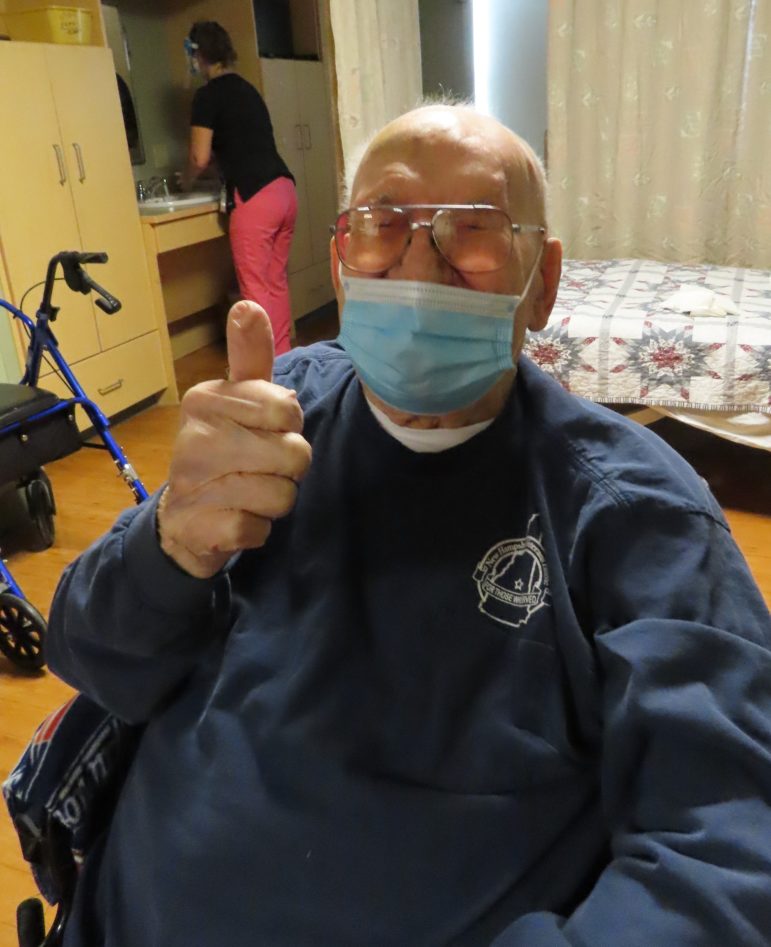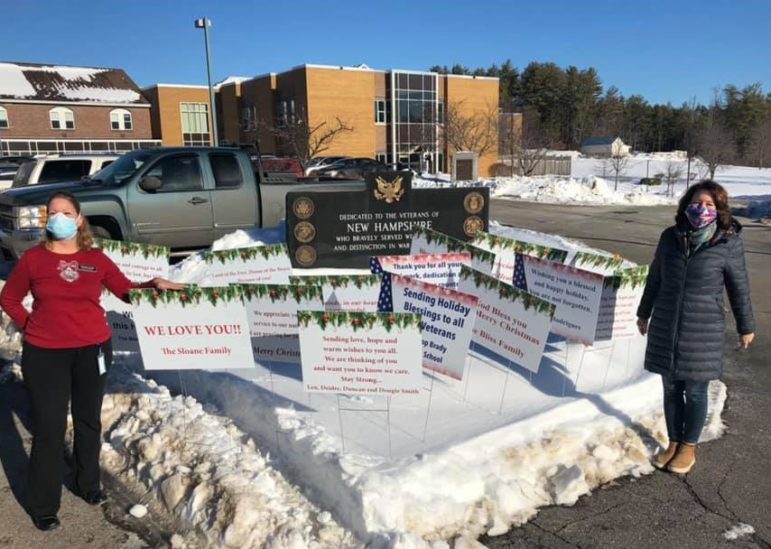By PAULA TRACY, InDepthNH.org
TILTON – Christmas came early at the New Hampshire Veterans Home in Tilton when the first vaccines to prevent COVID-19 were injected into the arms of residents and staff.
At its worst point, there were 190 residents and staff infected by the virus, and close to 40 have died.
Sarah Stanley, spokesman for the home said the home for veterans began to distribute COVID-19 vaccines Wednesday.
“These residents are delighted,” Stanley said.
Among the first to get the first of two Pfizer vaccines was Rita Landry, who served in the Air Force during the Korean Conflict. Also, Lorenzo “Joe” Perry, who served in the Navy in World War II, rolled up his sleeve to get the potentially life-saving injection.
Dwight Smith, who served in the Navy in World War II, was also happy to get pricked by a needle.

Not only were residents given the vaccines but some of their caregivers, some of whom have been working overtime.
This included Jenny Stillman, a nurse practitioner, and Angela Hawthorne, an infection control nurse.
Bolstering spirits were signs made for the residents and employees by volunteers from Bishop Brady High School. The effort was organized by Paula Dill of Boscawen, an event organizer at the school and the daughter of a veteran.
She said she was inspired to organize the sign effort after reading about the plight of the veterans in InDepthNH.org.
Gov. Chris Sununu has been criticized by some for not doing enough to stem the tidal wave of illness that broke over the state’s only veterans home on Nov. 20.
On Tuesday, during his televised weekly press briefing on the pandemic, he said things are beginning to improve at the home with about 21 active cases of the virus compared to a high of 190.

He also said that federal VA infectious disease staff came to Tilton several weeks ago to try to analyze the situation and help bring the outbreak under control.
State officials had previously stated that the nursing home vaccinations would begin on Monday of this week but Brendan Williams, spokesman for the long-term care industry in the state. He said that did not happen and the rollout would take a few weeks, with many nursing homes still in lockdown, and not able to access the vaccines likely until after Christmas.
Dr. Beth Daly of the Department of Health and Human Services, said in the past week, since the initial rollout, there have been 4,505 Pfizer doses sent to hospitals. They used 3,819 to help protect front line workers.
On Monday, Dec. 28, Daly said the state will begin distributing information on how many doses have been administered daily on the state’s COVID-19 dashboard.
She said the “big news” of the week was the surprise arrival of the Moderna vaccine for those 18 years and older. It will require two doses 28 days apart.
The Moderna vaccine has been shown to be equally as effective as the Pfizer vaccine and side effects are temporary and involve pain and redness at the site and a bit of fatigue the next day. She noted these are signs the vaccine is working.
Half the Moderna vaccines that arrived Tuesday will go to hospitals and the other half will go to launch the state-run fixed vaccination sites, set to open Tuesday, Dec. 29 at 13 locations across the state.
The vaccines will first go out to high-risk ambulatory providers and first responders.
She said the state is asking people to refrain from calling and to wait while agencies register their high-risk staff and call them about when it is time to be vaccinated.
In addition to the Moderna vaccine, the state received another round, this time 8,875 Pfizer doses this week to support, primarily long-term care residents and staff through CVS and Walgreens drug chain stores.
The Veterans Home is not part of that rollout but separate because it is a federal facility.
While Daly said the state does not have confirmed allocations for next week, it expects about 9,000 of each of the Pfizer and Moderna doses for a total of 18,000 each week and the state hopes to have higher allocations available in the near future.
Based on this, all of the high-risk phase 1a individuals should have at least one dose of the vaccine by the end of January or beginning of February.
Then, she said the state will go to the next phase and is still looking at who will be in that group.
“It is going to take several months to get everyone who wants to be vaccinated,” Daly said.
The governor said it was his hope that all in long-term care facilities and their care providers could be vaccinated by the third week of January if predicted allocations hold.





